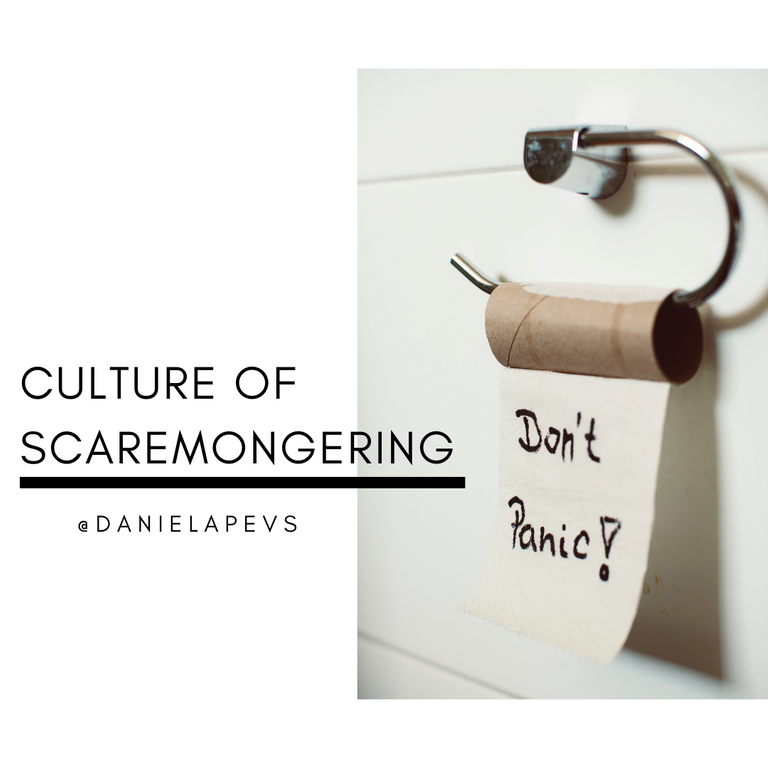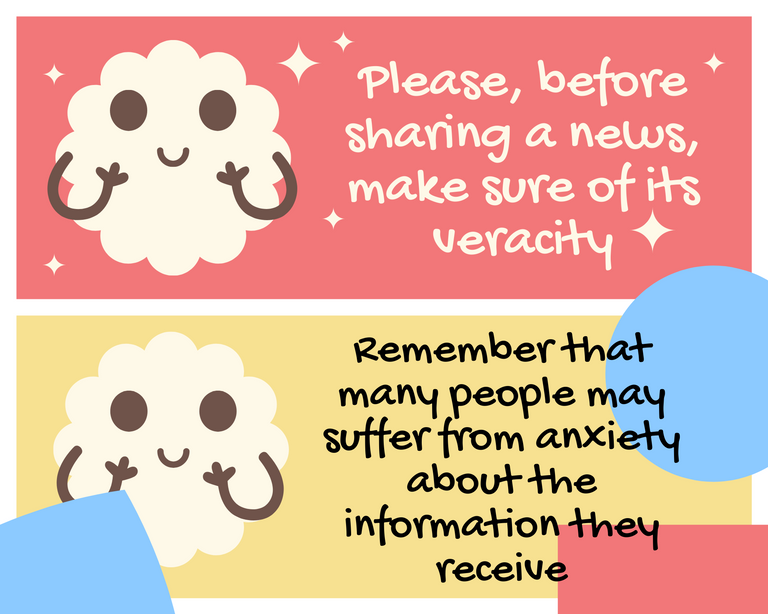Culture of scaremongering // Cultura de alarmismo
Este post está escrito en dos idiomas y dividido para facilitar la lectura.


The culture of alarmism is something that has always prevailed, exaggerating the information we receive and using it to generate chaos, is a very well thought out strategy to manipulate and stop the masses in the face of fear, since in the end that is what ends up generating this type of information, fear.
In a clear and concise definition, scaremongering is nothing more than generating panic at the moment of giving information, exaggerating along with it the dangers that may actually arise.
But who does this really benefit? In fact, it has served to gain space in politics, in wars, in the economy and social positioning. Have you ever heard of the stock market positioning generated by Nathan Rothschild in the Battle of Waterloo? Well, this was the last battle of Napoleon, Nathan Rothschild to learn the loss of it, sent as a message that who really had lost had been Wellington, as a rash act began to sell their shares on the market. When the rest of the shareholders saw this, they began to sell all their shares in unison at very low prices. Once in an advantageous position, Nathan Rothschild bought all the shares of those who had fallen into his alarmism, becoming richer, and by the time the news reached them, the one who had really lost the war had been Napoleon and not Wellington.
This is a good example of scaremongering. I don't like to talk about politics, but you understand me. However, in recent years, as a result of the Internet, the media and social networks, this type of event or news has become part of our cultures, where you can find cases where 7/10 news is false or over exaggerated to generate panic.
This is where critical thinking and research work comes in, which in fact each person should implement when receiving information. I emphasize this issue because I am really concerned about the intention and also, the speed of how this is transmitted from person to person, without thinking about the people who may suffer from anxiety when receiving all this.

One of the things I least tolerate when it comes to being part of groups on WhatsApp is when they bombard chats with ''news'' without official sources, audios of people talking in an altered way offering information without context and again, without sources to ensure its veracity.
How can we really stop scaremongering? Although we would like the world to change overnight, the truth is that the media will continue to use this to their advantage, since it is a feasible way to subject groups to the rules of an obedient system, fear paralyzes and, the human being is susceptible to being exposed to fear.
However, changes always begin with individuality and the work then begins with oneself.
But how? First it is very important to stop the person who is generating alarmism in a very polite way, clarifying that if the information he is presenting is NOT CONFIRMED, it is best to wait a little before sharing it. The second thing is to take your own initiative and investigate if the information you are receiving is true, only then can you work as a counter party and immediately deny the message received. Thirdly, and no less important, is to generate your own critical thinking, remember that by protecting your critical thinking and personal opinion you are less exposed to being manipulated by the information.
Please! Let's stop scaremongering and the yellow press, remember that many people can suffer anxiety attacks when they receive this kind of data and we don't know what else we can induce.

La cultura de alarmismo es algo que ha prevalecido desde siempre, el exagerar la información que recibimos y utilizarla para generar caos, es una estrategia muy bien pensada para manipular y detener a las masas ante el miedo, ya que al final es eso lo que termina generando éste tipo de información, miedo.
En una definición clara y concisa, el alarmismo no es más que generar pánico al momento de dar una información, exagerando junto con ella los peligros que puedan presentarse realmente.
Pero ¿realmente a quién beneficia esto? De hecho, esto ha servido para ganar espacios en la política, en guerras, en la economía y posicionamiento social. ¿Alguna vez escuchasteis el posicionamiento en la bolsa que generó Nathan Rothschild en la Batalla de Waterloo? Pues bien, ésta fue la última batalla de Napoleón, Nathan Rothschild al enterarse la perdida del mismo, envío como mensaje la noticia de que quién en realidad había perdido había sido Wellington, como acto presuroso empezó a vender sus acciones en el mercado. Al ver esto el resto de accionistas comenzaron a vender al unísono todas sus acciones a precios muy bajos, una vez en posición de ventaja Nathan Rothschild compró todas las acciones de aquellos quiénes cayeron en su alarmismo, haciéndose más rico, para cuando la noticia llegó a ellos, quién realmente había perdido la guerra había sido Napoleón y no Wellington.
Esto es un buen ejemplo sobre el alarmismo, no me gusta hablar de política pero ya me vais entendiendo. Ahora bien, en los últimos años, a raíz del Internet, los medios de comunicación y las redes sociales, este tipo de acontecimientos o noticias, pasaron a formar parte de nuestras culturas, donde podéis encontrar casos en los que 7/10 noticias son falsas o están sobre exageradas para generar pánico.
Aquí es dónde entra como rol el pensamiento crítico y el trabajo de investigación que de hecho, cada persona debería de implementar a la hora de recibir información. Enfatizo en éste tema porque realmente me preocupa la intención y también, la velocidad en cómo esto se transmite de persona a persona, sin pensar en su momento en las personas que pueden llegar a sufrir de ansiedad al ser receptores de todo esto.

Una de las cosas que menos tolero a la hora de ser parte de grupos en WhatsApp es cuando bombardean los chats con ''noticias'' sin fuentes oficiales, audios de personas hablando de manera alterada ofreciendo información sin contexto y nuevamente, sin fuentes que cercioren su veracidad.
¿Cómo podemos detener realmente el alarmismo? Aunque quisiéramos que el mundo cambiase de la noche a la mañana, lo cierto es que los medios de comunicación continuarán utilizando esto a su favor, puesto que es una manera factible para someter a los grupos a las reglas de un sistema obediente, el miedo paraliza y, el ser humano es susceptible al ser expuesto al miedo.
Sin embargo, los cambios siempre comienzan desde la individualidad y el trabajo comienza entonces por uno mismo.
Pero ¿cómo? Primero es muy importante detener a la persona que está generando alarmismo de forma muy educada, aclarando que si la información que está presentando NO ESTÁ CONFIRMADA, lo mejor es esperar un poco antes de compartirla. Lo segundo es tomar por iniciativa propia e investigar si la información que se está recibiendo es verdadera, sólo así puedes trabajar como la contra-parte y desmentir de inmediato el mensaje recibido. Tercero y no menos importante, es la de generar el pensamiento propio y crítico, recuerda que protegiendo tu pensamiento crítico y opinión personal estas menos expuesto a ser manipulado por la información.
¡Por favor! Detengamos el alarmismo y a la prensa amarilla, recordemos que muchas personas pueden sufrir ataques ansiosos al momento de recibir éste tipo de datos y no sabemos que más podemos inducir.


@tipu curate
Upvoted 👌 (Mana: 11/22) Liquid rewards.
Exactamente así es que manipulan a las masas, con temor y con alarma. Lamentablemente es una práctica muy extendida en nuestros días, y los medios de comunicación se prestan encantados para ese juego macabro. Buena reflexión. Un gran saludo.